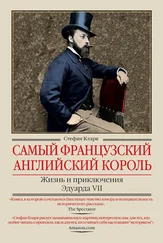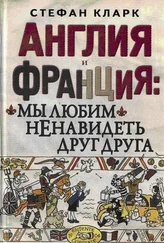Стефан Кларк - 1000 Years of Annoying the French
Здесь есть возможность читать онлайн «Стефан Кларк - 1000 Years of Annoying the French» весь текст электронной книги совершенно бесплатно (целиком полную версию без сокращений). В некоторых случаях можно слушать аудио, скачать через торрент в формате fb2 и присутствует краткое содержание. ISBN: , Издательство: Transworld Digital, Жанр: Старинная литература, на английском языке. Описание произведения, (предисловие) а так же отзывы посетителей доступны на портале библиотеки ЛибКат.
- Название:1000 Years of Annoying the French
- Автор:
- Издательство:Transworld Digital
- Жанр:
- Год:неизвестен
- ISBN:9781407067629
- Рейтинг книги:3 / 5. Голосов: 1
-
Избранное:Добавить в избранное
- Отзывы:
-
Ваша оценка:
- 60
- 1
- 2
- 3
- 4
- 5
1000 Years of Annoying the French: краткое содержание, описание и аннотация
Предлагаем к чтению аннотацию, описание, краткое содержание или предисловие (зависит от того, что написал сам автор книги «1000 Years of Annoying the French»). Если вы не нашли необходимую информацию о книге — напишите в комментариях, мы постараемся отыскать её.
1000 Years of Annoying the French — читать онлайн бесплатно полную книгу (весь текст) целиком
Ниже представлен текст книги, разбитый по страницам. Система сохранения места последней прочитанной страницы, позволяет с удобством читать онлайн бесплатно книгу «1000 Years of Annoying the French», без необходимости каждый раз заново искать на чём Вы остановились. Поставьте закладку, и сможете в любой момент перейти на страницу, на которой закончили чтение.
Интервал:
Закладка:
In fact, Obama could probably consider himself lucky to be flavour of the month, because in June 2009 France was still smarting from two American low punches. First, as a parting shot when George W. Bush left office, his administration seems to have taken revenge for the French stand on Iraq by singling out Roquefort cheese for an inexplicable 300 per cent import duty, effectively pricing it out of the American market. As this was almost literally the last trade measure implemented by the administration, it surely can’t have been a random move.
Another American gaffe came from the newly elected Obama himself when he sent a letter to former President Chirac saying, ‘I am certain that we will be able to work together in the coming four years, in a spirit of peace and friendship to build a safer world.’ Hadn’t Obama’s advisers noticed the régime change in France back in May 2007? Shocking, perhaps, but it was almost certainly not meant as a personal insult. One could even say that the Sarkozy –Chirac confusion was a symptom of the way America sees the world – one, maybe two, superpowers on top, with Britain at America’s feet, a few key enemies leaping up to attract attention to themselves, and an anonymous gaggle of less important countries bustling about below. Like it or not, to at least one adviser in the new American president’s team, France was on the same level of importance as Taiwan, Mozambique and Lithuania, and who knows the names of their leaders?
Plus ça change, plus c’est la même chose
There are some who say that we should bury the hatchet and simply forget all our supposed differences. We are all grown-ups now and should get along as partners in the modern world. History, these people seem to be saying, is in the past. But, as William Faulkner once said: ‘The past is never dead. In fact, it’s not even past.’
In other words, history is in the making every day, and to ignore the past would be to deny the theory of evolution. Britain and France, and more recently North America, are the way they are today because of our constant fighting over the centuries. Our spheres of influence in the political world date back centuries. As we have seen in earlier chapters, many of Britain and France’s political institutions grew up in direct opposition to what l’ennemi was doing. France’s modern-day politicians, soldiers and administrators almost all come out of schools set up by Napoleon, and have Bonaparte’s inherent mistrust, mingled with envy, of l’Anglo-Saxon.
It is because of this that every minor political altercation gets blown out of proportion. The reaction is never just: ‘Oh, why are they doing that?’ It’s always: ‘Bloody typical, those scheming so-and-sos, they did exactly the same thing back in 1415/1688/1789/1815/1914/1940/2003’ etc., etc. However much we try to re-invent our relationship, it stays fundamentally the same. It’s in our genes.
This doesn’t mean that the French and the Anglos can’t get on with each other, of course. We share such a long common history that we are like family. We’re side by side or face to face in all history’s photo albums, and when things are going smoothly, we can laugh nostalgically at the way we used to fight all the time. Our scrapbook really is a book about scrapping.
And we do manage to resolve some conflicts once and for all. Take the Eurostar–Waterloo problem, for example. In November 2007, the Queen officially ended any suspicion of an anti-French insult when she opened the new Eurostar terminal at St Pancras station. Diplomatic incident over, n’est-ce pas ?
Well, no, actually. Because St Pancras, a Roman Christian who was executed in AD 303 for refusing to perform a sacrifice to Roman gods, is the patron saint both of children and of the island where his relics are supposedly to be found – Corsica. Yes, Corsica, which is not only the birthplace of Napoleon but is also the island whose masked independence fighters regularly take potshots at French administrators and blow up the holiday homes of French mainlanders. So the new London Eurostar terminal is named after the patron saint of anti-French terrorists.
But then, after 1,000 years of annoying the French, what did you expect?
FIN
1 French has two words for the noun ‘use’ – emploi and utilisation – and in an apparent attempt to show the richness of the language, the law gives them both, even though the average French person wouldn’t be able to explain the difference.
2 He was wrong – it’s not anti-French at all if you read it carefully.
Quotations
This is not intended to be a completist compendium of quotations. It’s a collection of pithy and mischievous sayings, made about or by the French, all of which I came across while researching the book and haven’t used in the main text. A sort of French traffic jam of quotations, in fact.
Joan of Arc (1412–31), French soldier and saint:
‘Of the love or hatred of God for the English, I know nothing, but I do know that all of them will be booted out of France, except those who will die here.’
William Shakespeare (1564–1616), English playwright, poet and occasional propagandist, in his play Richard III , Act I, Scene iii:
‘GLOUCESTER … Because I cannot flatter and speak fair,
Smile in men’s faces, smooth, deceive and cog,
Duck with French nods and apish courtesy,
I must be held a rancorous enemy.’
Sir Philip Sidney (1554–86), English soldier and poet:
‘That sweet enemy, France.’
Fougeret de Montbron (1706–60), French writer and Anglophile:
‘We are the only nation in the universe that the English do not disdain.
Instead they pay us the compliment of hating us as ferociously as possible.’
‘We should be flattered – every foreigner in London is called a “French dog”.’
Samuel Johnson (1709–84), English dictionary writer:
‘A Frenchman must be always talking, whether he knows anything of the matter or not; an Englishman is content to say nothing when he has nothing to say.’
Louis XV (1710–74), King of France:
‘The English have corrupted the mind of my kingdom. We must not expose a new generation to the risk of being perverted by their language.’
Laurence Sterne (1713–68), Irish writer, in his novel The Life and Opinions of Tristram Shandy :
‘The French believe that talking of love is making it.’
Horace Walpole (1717–97), British writer, cousin of Admiral Nelson:
‘I do not dislike the French from the vulgar antipathy between neighbouring nations, but for their insolent and unfounded airs of superiority.’
Pierre-Augustin Caron de Beaumarchais (1732–99), French writer and political intriguer, in his play The Marriage of Figaro :
‘The English do add here and there some other words when speaking, but it is obvious that “God-damn” is the foundation of their language.’
Louis-Sébastien Mercier (1740–1814), French writer, after a visit to London:
‘Londoners think that in Paris we are covered in braids but are either dying of starvation or eating nothing but frogs.’
Antoine de Rivarol (1753–1801), French writer, in his book On the Universality of the French Language :
‘Something that is not clear is not French.’
(The modern French novel had yet to be invented.)
Horatio Nelson (1758–1805), British admiral, giving instructions to a new recruit:
‘Firstly you must always implicitly obey orders, without attempting to form any opinion of your own regarding their propriety. Secondly, you must consider every man your enemy who speaks ill of your king; and thirdly you must hate a Frenchman as you hate the devil.’
Читать дальшеИнтервал:
Закладка:
Похожие книги на «1000 Years of Annoying the French»
Представляем Вашему вниманию похожие книги на «1000 Years of Annoying the French» списком для выбора. Мы отобрали схожую по названию и смыслу литературу в надежде предоставить читателям больше вариантов отыскать новые, интересные, ещё непрочитанные произведения.
Обсуждение, отзывы о книге «1000 Years of Annoying the French» и просто собственные мнения читателей. Оставьте ваши комментарии, напишите, что Вы думаете о произведении, его смысле или главных героях. Укажите что конкретно понравилось, а что нет, и почему Вы так считаете.












